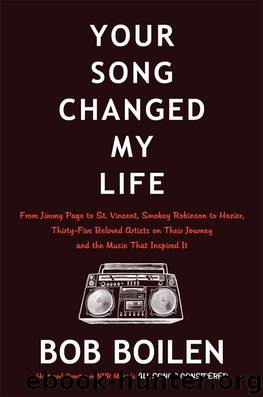Your Song Changed My Life: From Jimmy Page to St. Vincent, Smokey Robinson to Hozier, Thirty-Five Beloved Artists on Their Journey and the Music That Inspired It by Bob Boilen

Author:Bob Boilen [Boilen, Bob]
Language: eng
Format: azw3, epub
Publisher: HarperCollins
Published: 2016-04-12T04:00:00+00:00
PHILIP GLASS
“Some people would say, ‘You know, Mr. Glass, I really tried and I’ve tried to listen to this piece, and I don’t get it. What should I do?’ And I said, ‘Go listen to something else.’ I said, ‘You don’t have to listen to it.’ That’s why there’s all this different music around. It’s for different people.”
Philip Glass’s compositions are some of the most important of the late twentieth century, but his music is not for everyone. Its magic often lies in its unending repetition and incessant pulse. It owes as much to Bach as it does to trance, and can be breathtakingly tearful and perpetually throbbing. Philip has written ten symphonies, hundreds of sonatas, a massive number of movie scores, and twelve tremendously groundbreaking operas. His music is serious, with a wide range of influences, everything from electronica and jazz to soundtracks and the concert music of his contemporaries. When Philip tells me the song that changed his life is Spike Jones’s zany rendition of Rossini’s William Tell Overture, I am flabbergasted. Seriously? Philip Glass likes funny things?
Philip Glass is the son of Jewish immigrants and was raised in Baltimore, or, as he would say, Ball-em-muhr. His mom, Ida, was an English teacher and librarian. His dad, Ben, was an auto mechanic turned radio repairman who opened his own shop, General Radio. “Ben himself was an interesting guy because he learned a lot of things on his own. He learned how to fix radios because he was working with the Pep Boys, who had an auto accessories line, so they started putting radios into these things, and he realized that people were going to break their radios, so he learned how to fix them. Now the same thing happened, I remember, around 1946, when television sets came out. . . . He sent away for a television do-it-yourself kit and he built one. By the time he had built one, he knew how to fix it.” That sort of self-starting attitude and determination runs through Philip’s own life as a steelworker, plumber, New York cabdriver, composer, and musician.
Growing up in the 1940s, Philip and his older brother, Marty, spent a lot of time working in their father’s shop, which also sold records. “The records were really a kind of a distraction for the people waiting for their radios.” At first they stocked only a handful, but later the records took over the store. Ben didn’t know much about music at first, so he learned by listening. “The records he couldn’t sell he would bring home to listen to. His idea was, well, if he couldn’t sell them, there was something wrong with them, and if he listened to them, he could figure out what that was, and he wouldn’t make the mistake of buying those records that didn’t sell.” I love this notion. It’s such a logical approach to musical taste, which is usually less an intellectual choice than one of the gut. Ben soon discovered that the music he had trouble selling was predominantly modern classical.
Download
Your Song Changed My Life: From Jimmy Page to St. Vincent, Smokey Robinson to Hozier, Thirty-Five Beloved Artists on Their Journey and the Music That Inspired It by Bob Boilen.epub
This site does not store any files on its server. We only index and link to content provided by other sites. Please contact the content providers to delete copyright contents if any and email us, we'll remove relevant links or contents immediately.
| Diaries & Journals | Essays |
| Letters | Speeches |
The Rules Do Not Apply by Ariel Levy(4953)
Bluets by Maggie Nelson(4542)
Too Much and Not the Mood by Durga Chew-Bose(4333)
Pre-Suasion: A Revolutionary Way to Influence and Persuade by Robert Cialdini(4214)
The Motorcycle Diaries by Ernesto Che Guevara(4081)
Walking by Henry David Thoreau(3949)
Schaum's Quick Guide to Writing Great Short Stories by Margaret Lucke(3368)
What If This Were Enough? by Heather Havrilesky(3302)
The Daily Stoic by Holiday Ryan & Hanselman Stephen(3297)
The Day I Stopped Drinking Milk by Sudha Murty(3186)
The Social Psychology of Inequality by Unknown(3013)
Why I Write by George Orwell(2944)
Letters From a Stoic by Seneca(2789)
A Short History of Nearly Everything by Bryson Bill(2681)
A Burst of Light by Audre Lorde(2588)
Insomniac City by Bill Hayes(2537)
Feel Free by Zadie Smith(2473)
Upstream by Mary Oliver(2384)
Miami by Joan Didion(2364)
